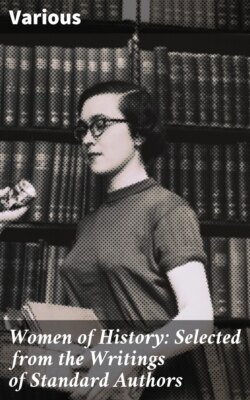Читать книгу Women of History: Selected from the Writings of Standard Authors - Various - Страница 13
На сайте Литреса книга снята с продажи.
OCTAVIA.
ОглавлениеTable of Contents
[B.C. 11.]
BAYLE.
HE grand-niece of Julius Cæsar and sister of Augustus, was one of the most illustrious dames of ancient Rome. She was married first to Claudius Marcellus, who was consul in the year of Rome 704; and very soon after his death she married Marc Antony, a union very much desired by the friends of both the parties, as likely to conciliate Antony and Cæsar, and thereby promote peace. Octavia, herself a highly virtuous woman, was well formed to promote this desirable object; but her husband afterwards so completely abandoned himself to his passion for Cleopatra, that he seemed to have lost all rational control over himself. Before he fell under this slavery of an unholy love, Octavia by her counsels exercised much power over him for good; but now matters were changed, and he left her in Italy, when in 717 he sailed from Tarentum for the East. Some time after, she went forth upon the world to try to find him; but having learned from letters received from him that he desired she should stop at Athens, she arrested her steps at that city, even while she was aware that he was merely deceiving and laughing at her. She then returned to Rome, but would not, though recommended by Augustus, remove from the house of her husband; there she remained, taking upon her domestic cares and managing all things as if she still had in the faithless Antony an object of admiration. She evinced towards his children by Fulvia, his former wife, the same affection she had hitherto shown them, and reared and educated them with the same vigilance. She was willing to suffer all, but that the injuries she received at the hands of her husband should be the cause of a civil war, and in subsequently obeying his command to leave his house, her only regret was that she saw that it would be held to be the cause of political commotion. By such conduct she injured the character of Antony, even while she was not aware of the effects of her conduct; for the natural consequence was an increase of the indignation and contempt for the man who could leave such a woman for such another as Cleopatra.
The war which followed terminated, as every one knows, by the entire ruin of Marc Antony. Subsequently fortune seemed to promise Octavia a high measure of happiness. She had a son of great promise, who married the daughter of Augustus, and was viewed as the heir of the Empire; but he died in the flower of his age, and this was a shock to Octavia for which she would receive no consolation. She plunged herself into solitude and incurable melancholy. She could bear to see no image of Marcellus her son, nor even to hear his name mentioned. Hating all mothers, she raved principally against Livia, to whose son passed the honours and glory that were promised to her own. Sunk in darkness and solitude, she would not even see her brother Augustus, nor would she hear the songs of praise which had been offered to the many virtues of the son she had so dearly loved. Not even the glory of her brother had any influence in ameliorating her melancholy, if it was not that she viewed his success with aversion; and thus segregated from all human sympathies, she lived only in the exercise of the solemn offices of religion.
